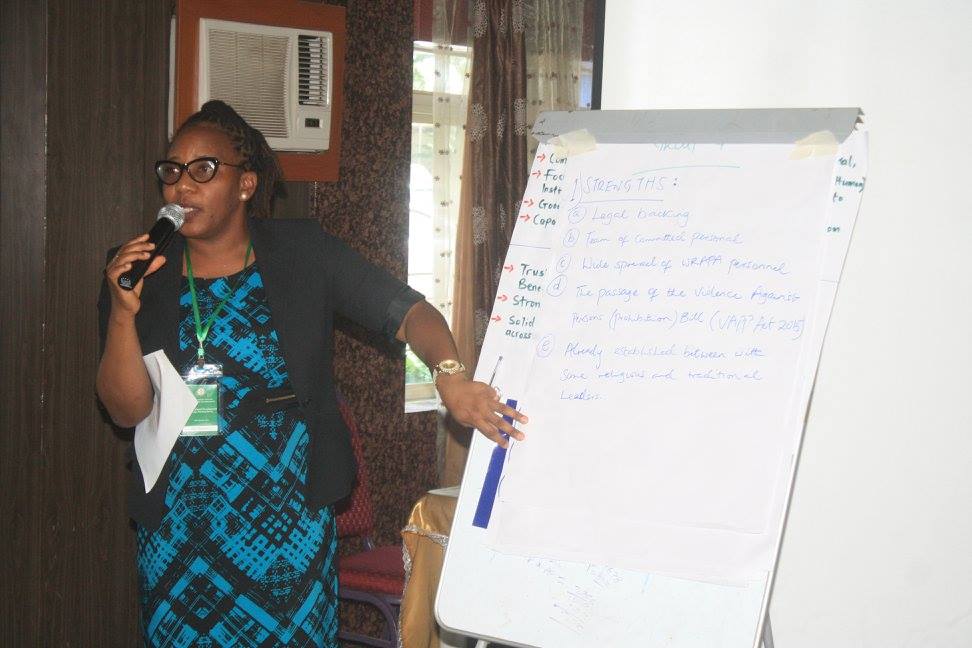BACKGROUND
Gender Affirmative Action (GAA) is a platform of women-focused government and non-government organizations supported by DFID through its Coalitions for Change (C4C) Programme (July 2008 – Sept 2011).
GAA is overseen by a Steering Committee comprised of 8 institutions from both the demand (civil society demands for change) and supply side (government supplies the change).
GAA employs an Issue based approach that engenders interventions constructed around issues and felt needs with government and its agencies, CSOs, communities, the media, the organized private sector and development partners working together to achieve specified results and impact. It engenders strengthened commitment, depth of impact and sustainability
Furthermore, Women’s low representation and participation in political parties and their governance structures are the stark realities of Nigeria’s democracy today. Global and local organizations and individual activists continue to work conscientiously to reverse this trend. Advocacy and social mobilization have resulted in the current President’s declaration of commitment to implement 35% affirmative action for women in appointive positions in Nigeria as recommended by the National Gender Policy. Concerted efforts are needed to identify suitably qualified women to occupy these positions and to hold the President accountable for this promise.
Gender and Affirmative Action (GAA) is an issue-based project supported by DfID through the Coalitions for Change (C4C) programme and works to advance gender equity through affirmative action. The issue-based approach is a unique programming method that brings a core of committed stakeholders from different sectors together to work collaboratively on a single issue at a time. GAA is overseen by a steering committee made up of demand and supply side organizations working collaboratively to create spaces for women in politics and the socio-economic sphere. Currently, the IBP’s work is designed to capture a singular objective – Quantity and quality of women in socio economic and political sphere increased. The project was designed to deliver three key results as follows:
- Gender Technical Unit serving as a resource to Parliamentarians, 5 National Assembly committees (Senate and House Committees on Women Affairs, House Committee on Human Rights, Senate Committee on Judiciary, Human Rights and Legal Matters , House Committee on Women in Parliament and House Committee on Rules and Business), Federal Ministry of Women Affairs, and Civil Society working on Affirmative Action.
- Increased numbers of political parties adopting and complying with affirmative action mechanisms.
- Lessons and learning from Issue-Based Approach (IBA) process and results documented and disseminated.
In June/July 2011, GAA commissioned a performance survey to highlight its key achievements, challenges and lessons learned using the issue-based approach to programming. The review methodology included:
- Desk review of selected documents
- In-depth interviews with selected stakeholders
- Scanning of activity reports to identify clear and verifiable progress for all indicators in the IBP’s results framework.
- Validation of findings through stakeholder consultation.
Objective of the project
- To increase the quality and quantity of women in Nigeria’s socio-economic and political sphere
OUTCOMES/IMPACT OF THE PROJECT
- A Gender Technical Unit has been established within the premises of the National Assembly (first of its kind in Africa) and currently serves as a resource to a wide range of stakeholders within the Assembly and within Civil Society ranks (result area 1).
- GAA, through its advocacy and lobbying efforts prior to the 2011 elections has succeeded in influencing political parties with clear proposals to acknowledge and take specific actions that concretely open up the political space for women’s participation on the one hand, and has built women’s capacity on the other hand to claim these spaces by participating meaningfully in politics.
- GAA and its partners continue to promote and model the IBA as a veritable programming approach that enhances deeper and more sustainable achievements due to horizontal and vertical institutional links and contributions.
- GAA is currently recognized and patronized by both demand and supply side organizations as a technical resource on gender equality and women empowerment issues.
- GAA has succeeded in bringing high level visibility to women’s issues in influential circles.
- GAA’s work has strengthened the nexus between civil society and government. The mutual suspicion that existed between CSOs and government has given way to partnership and collaboration.
- GAA has given visibility and meaning to Affirmative Action. This has fostered buy–in of key stakeholders.
- It is widely believed that GAA’s work highly influenced both the work of the Nigerian First Lady’s Women for Change Initiative which extensively mobilized energy and attention on 35% AA throughout the country using the campaign platform for the 2011 elections leading to commitments by State Governors and later the President’s declaration of support for 35% affirmative action in appointive posts.
- GAA has packaged lobbying as a pragmatic, measurable strategy. In collaboration with the Federal Ministry of Women Affairs and Social Development (FMWASD), an existing mechanism of the latter was transformed into a substantive lobby group and deployed before the 2011 elections to elicit commitment from political parties to support women’s candidacy.
- GAA has brought Women with Disabilities on board as partners. This will further give voice to their hitherto neglected issues.
- A gendered lesson learning and sharing space for expanding women’s participation in policy and politics created
- A structured process created for engaging with strategic stakeholders towards promoting 35% Affirmative Action for Women in line with the National Gender Policy
- Mechanism to enhance the executive and legislative processes of domesticating CEDAW, AU Protocol in place.


